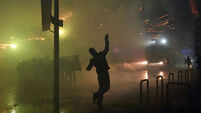Prodi seeks support for new government
Italy’s caretaker prime minister Romano Prodi summoned his allies to a late night meeting tonight to see if they could commit themselves to backing him convincingly enough to possibly put together another government.
Mr Prodi’s summit of coalition party leaders came just hours before their planned appointment with president Giorgio Napolitano, who is looking into which politicians might have enough backing in parliament for a new government.














